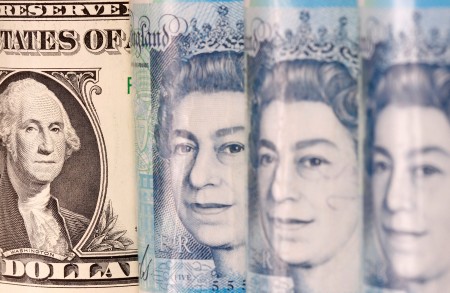LONDON (Reuters) – The pound hit its highest in nearly two years against the euro on Monday, though it dropped against the dollar, as the common currency tumbled after French President Emmanuel Macron called a snap election after being trounced in an EU vote by the far right.
The euro dropped to as low as 84.53 pence, its lowest since August 2022, breaking out of its recent range against the pound, and also falling against the dollar along with declines in other French and euro zone assets.
It was last down 0.37% at 84.59 pence.
Centre, liberal and Socialist parties were set to retain a majority after the European Parliament elections, but eurosceptic nationalists made the biggest gains, raising questions about the ability of major powers to drive policy in the bloc.
Making a risky gamble to reestablish authority, Macron called a parliamentary election with a first round on June 30.
“Expect to hear much made of the diverging political scenes, where the forthcoming UK general election is expected to present the UK with a very large Labour majority, whereas the French election promises to deliver a parliament diametrically opposed to the presidency,” said Chris Turner, ING’s global head of markets in a note.
“We probably cannot rule out EUR/GBP edging a little lower this week – perhaps to 0.8400 … But we think this sterling rally does not last and probably reverses next week when we hear from the Bank of England next Thursday – likely preparing the market for an August rate cut,” Turner added.
British wage data for April, due Tuesday, is the main data point of this week, heading into that BoE meeting. Markets have seen a change in policy at that meeting as very unlikely since April’s sticky services inflation.
Also in the mix, an industry survey, published Monday, indicated Britain’s recruitment market is poised for a recovery.
But the pound dropped 0.2% against the dollar on Monday, to $1.2698, continuing to fall after a 0.5% drop Friday as hotter than expected U.S. jobs data caused markets to push back bets on the first Federal Reserve interest rate cut late into 2024.
(Repoting by Alun John; Editing by Mark Potter)


